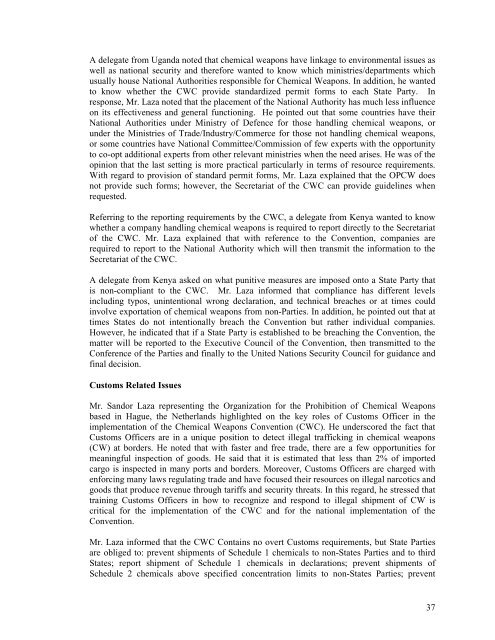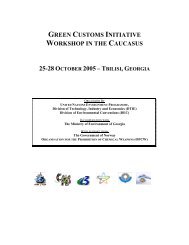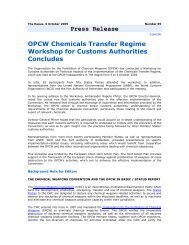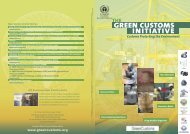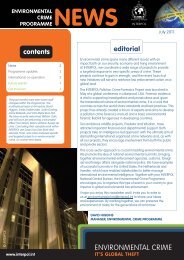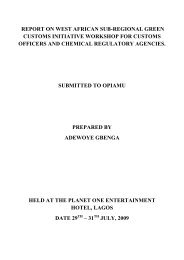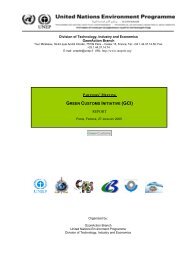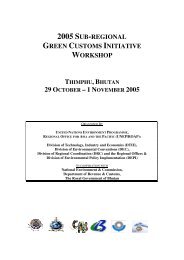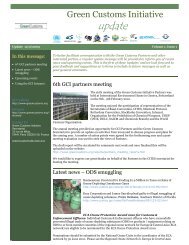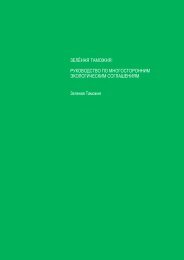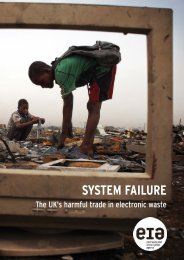Arusha - Green Customs Initiative
Arusha - Green Customs Initiative
Arusha - Green Customs Initiative
You also want an ePaper? Increase the reach of your titles
YUMPU automatically turns print PDFs into web optimized ePapers that Google loves.
A delegate from Uganda noted that chemical weapons have linkage to environmental issues as<br />
well as national security and therefore wanted to know which ministries/departments which<br />
usually house National Authorities responsible for Chemical Weapons. In addition, he wanted<br />
to know whether the CWC provide standardized permit forms to each State Party. In<br />
response, Mr. Laza noted that the placement of the National Authority has much less influence<br />
on its effectiveness and general functioning. He pointed out that some countries have their<br />
National Authorities under Ministry of Defence for those handling chemical weapons, or<br />
under the Ministries of Trade/Industry/Commerce for those not handling chemical weapons,<br />
or some countries have National Committee/Commission of few experts with the opportunity<br />
to co-opt additional experts from other relevant ministries when the need arises. He was of the<br />
opinion that the last setting is more practical particularly in terms of resource requirements.<br />
With regard to provision of standard permit forms, Mr. Laza explained that the OPCW does<br />
not provide such forms; however, the Secretariat of the CWC can provide guidelines when<br />
requested.<br />
Referring to the reporting requirements by the CWC, a delegate from Kenya wanted to know<br />
whether a company handling chemical weapons is required to report directly to the Secretariat<br />
of the CWC. Mr. Laza explained that with reference to the Convention, companies are<br />
required to report to the National Authority which will then transmit the information to the<br />
Secretariat of the CWC.<br />
A delegate from Kenya asked on what punitive measures are imposed onto a State Party that<br />
is non-compliant to the CWC. Mr. Laza informed that compliance has different levels<br />
including typos, unintentional wrong declaration, and technical breaches or at times could<br />
involve exportation of chemical weapons from non-Parties. In addition, he pointed out that at<br />
times States do not intentionally breach the Convention but rather individual companies.<br />
However, he indicated that if a State Party is established to be breaching the Convention, the<br />
matter will be reported to the Executive Council of the Convention, then transmitted to the<br />
Conference of the Parties and finally to the United Nations Security Council for guidance and<br />
final decision.<br />
<strong>Customs</strong> Related Issues<br />
Mr. Sandor Laza representing the Organization for the Prohibition of Chemical Weapons<br />
based in Hague, the Netherlands highlighted on the key roles of <strong>Customs</strong> Officer in the<br />
implementation of the Chemical Weapons Convention (CWC). He underscored the fact that<br />
<strong>Customs</strong> Officers are in a unique position to detect illegal trafficking in chemical weapons<br />
(CW) at borders. He noted that with faster and free trade, there are a few opportunities for<br />
meaningful inspection of goods. He said that it is estimated that less than 2% of imported<br />
cargo is inspected in many ports and borders. Moreover, <strong>Customs</strong> Officers are charged with<br />
enforcing many laws regulating trade and have focused their resources on illegal narcotics and<br />
goods that produce revenue through tariffs and security threats. In this regard, he stressed that<br />
training <strong>Customs</strong> Officers in how to recognize and respond to illegal shipment of CW is<br />
critical for the implementation of the CWC and for the national implementation of the<br />
Convention.<br />
Mr. Laza informed that the CWC Contains no overt <strong>Customs</strong> requirements, but State Parties<br />
are obliged to: prevent shipments of Schedule 1 chemicals to non-States Parties and to third<br />
States; report shipment of Schedule 1 chemicals in declarations; prevent shipments of<br />
Schedule 2 chemicals above specified concentration limits to non-States Parties; prevent<br />
37


